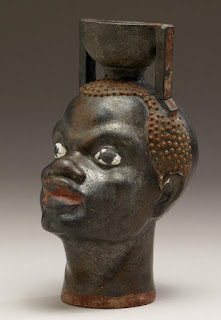"The Greeks were never what the Germans thought of them" On the criticism of philhellenism
For a long time "Greece" was the projection screen for idealized ideas. But what made the Philhellenes so special? And what about philhellenism today?
Caricatures are currently playing an aggressive to mean role in Greek-German relations. May I help you look at an older caricature by my friend Kostas Mitropulos? [1] A delighted, laughing man in antique hoplite armor stands on the right: round shield with meander pattern, breastplate, the open storm helmet, greaves and hand spear are easy to see. The gaze and the words are directed towards the person opposite, identified by their cap, black hair and mustache as the prototype of a Greek named Jorgos, Kostas or Jannis, whose gaze seems somewhat perplexed. The former applies the ancient Greek sentence Άνδρα μοι έννεπε μούσα πολύτροπον ... ’to the latter, whereupon the razor-sharp conclusion: ah German - that can only be a German.
The following distinctive features point to the so-called "Philhellenes":
- His obvious enthusiasm for the country and its people even at times when we meet a Jorgos, and no longer a Perikles, at a train station.
- His completely out of place travel clothes for the country of his enthusiasm, which testifies that he is in search of classical ancient Greece.
- At the same time, the unsuitable presentation of the humanistically educated hoplite impressively shows that he did not find out about his living conditions prior to his encounter with the real Greek and is therefore simply poorly informed.
- The highly educated is in principle well-disposed towards his contemporary counterpart, but will hardly be able to communicate with him, since he uses a language phase of Greek from 2,800 years ago.
- It is to be feared that he does not care and that, as his name suggests, he is heading for the Hellenes, to whom he does not include this Jorgos, as he does not react appropriately to his Homer quote.
According to their definition, Philhellenes are "Hellenic-friendly" beings - Hellenes first of all understood as virtual structures that once created said classical ancient Greek cultural monuments. One of the most important representatives of that classical epoch, the speaker Isocrates, creates a clear and helpful definition:
"Our polis has managed to ensure that the name 'Hellenes' no longer applies according to their belonging to the nation, but according to their convictions, so that those who Hellenes are called who are more likely to participate in our education than those of the same parentage." [2]
The first Philhellenes: Rome
The first to adhere to this definition and to place their entire education under the same maxim were the ancient Romans. In all textbooks on ancient Greek history, the year 168 BC applies. With the victory of the Romans after the so-called 3rd Macedonian War as the end of the freedom of the Greeks. But the victors were permeated by a kind of cultural sovereignty of the defeated. We are faced with the astonishing phenomenon that a state that not only strived for world domination, but had also largely realized it, left the field of culture to those Greeks whose intellectual and literary creations represented models and models for the Romans in every respect, in the original language, the Greek.
The educated Roman of the classical period was bilingual and listened to the speeches of the Greek philosophers and rhetoricians who recited them in the Attic dialect of 400 years ago. This educated Roman of the classical period was taught in a written Greek language by private Greek teachers. Grandiose creations such as the works of Aeschylus, Sophocles, Euripides and Aristophanes in the 5th and 4th centuries BC were the style patterns for philosophical dialogues, court speeches and works of contemporary history in Roman times. It was the sister city - Polis - Athens, their classical cultural creations Even if we do not call that Roman philhellenism "Philhellenism", because the Romans called the Greeks "Graeci" and not Hellenes (which is why we, following the Romans, call the Hellenes "Greeks"): With This Roman idealization and fixation on the so-called Greek classical period uncovered the historical roots of what we call "philhellenism" today.
Classics and Romantics of German Philhellenism
As early as the Renaissance, Central Europe was pointed out to the possibility of adopting ancient and especially Greek ideals of the social order, adopting them and acting accordingly. From a cultural-historical point of view, philhellenism is generally understood to mean that movement of the late 18th and first half of the 19th century, which has to do politically with the liberation struggles of the Greeks from the Ottomans, and in intellectual history with romanticism.
The peaks of Romanticism were climbed in Germany to let the view wander over that virtual Arcadia from above. We should once again expressly make sure that a poet like Friedrich Hölderlin (1770-1843) placed all his hopes on a more beautiful time, which was pre-formed in classical Greece, in which "genius" applies again and the preparation of the state of affairs he writes poetically as "return of the gods".
When Johann Wolfgang von Goethe was invited by Count Waldeck in Sicily to go to Greece on his sailing ship - we would say today: only a stone's throw away - he noted in his diary that, given this perspective, he was "no longer capable of any syllable" been. And he's not driving. What should Hölderlin or Goethe have been looking at there too? This Arcadian Greece predominantly only existed in their heads, and Holderlin was as well aware of that as Goethe was. A comparison of this virtual, romantically elevated, idealized ancient landscape with the reality at the southern tip of the Balkans was not an issue at all.
A mountain of misunderstandings
Such misunderstandings had already accumulated since the so-called "liberation struggles" in the first half of the 19th century: Mercenaries from Württemberg, Switzerland or Bavaria returned to their homeland and reported about crooks who, contrary to all ancient Greek ethics, were underhanded in the mountains of Arcadia. At the latest after the overthrow of the Wittelsbacher Otto from the Greek royal throne, the philhellenic movement, which had made its contribution to the formation of a German national feeling, returned to its study rooms. For the future, Melanchthon or Kapnion - as Philipp Schwarzert or Johannes Reuchlin called themselves now - remained unsullied from any approach to the real country of Greece.
Greek Philhellenes?
Incidentally, it was not only those European Philhellenes who propagated the leap over the Christian Middle Ages to the Ancient Hellenes, but also those enlightened Greeks of the Diaspora who, even committed to humanistic ideals, resorted to Greek antiquity.
The Greeks in Greece themselves also learned quickly. In the first chapter of his memoirs, Ioannis Makrygiannis used the term Ρωμαίοι - Romaioi for Greek compatriots; in the second chapter, in which he deals with those Bavarians and other Philhellenes who were active in Greece at the time, he calls them Έλληνες - Hellenes.
Others objected to this equation. The mocking provocations on the part of Jakob Philipp Fallmerayer, that a drop of ancient Hellenic blood did not flow in any modern Hellenes, not only promoted and accelerated the national self-confidence of the Greeks. They were also fundamental to the Greek fear of being misunderstood from abroad.
The humanistic high school
In Europe, however, no or only superficial notice was taken of these needs. Rather, it was here that Wilhelm von Humboldt introduced the humanistic grammar school, which radiated from 19th century Prussia to all of Central Europe. "In no country," writes Jens Jessen in an article in ZEIT on March 4, 2010, "in no country, not even Lord Byron's England, have the Greeks been idealized to the same extent as we are. Von Winckelmanns' noble simplicity and silent greatness' to the Alexander biography by Gustav Droysen, who recommended the Prussians as the Macedonians of modern times, from the step of the heavily armed hoplites of Athens to the spiritual splendor of a fragmented nation, the references in which the Germans themselves as the true heirs, at least recognized soulmates of the ancient Greeks." But, as Jesse put it, "The Greeks were never what the Germans thought of them."
Friendship with Greeks
In Humboldt's time it was also possible to travel to the then highly praised and revered land of one's own ideal ancestors, albeit at the risk of having to correct the idealized image in the confrontation with reality. So in the discourses of philhellenism it is always about the defense of a humanistic ideology, which consisted of a kind of "unrealistic" isolation from possible native speakers - an absurdity at the latest when one pointed out to those who were born later that they were pronouncing ancient Greek incorrectly and that, as Aristophanes tells us, the sheep do not scream "wi wi", but "bä bä". When I came to the Aristotle University in Thessaloniki as a DAAD scholarship holder in 1959, I was pretty much like the good-natured Philhellenic in the Mitropulos caricature above. Equipped with a fair knowledge of ancient classical culture and language, I was completely inexperienced in dealing with the present-day inhabitants of these noble regions. It was "Philoxenia" - hospitality as one of the highest and most sacred goods of Greek culture then and now, which allowed the real modern Greeks to approach even these old-school Philhellenes.
Post-philhellenism
Today the teaching of ancient Greek at German schools and universities has shrunk to such an extent that it has become a negligible quantity. Enthusiasm for Greece in the old sense of turning to classical Greek culture and language to the exclusion of today's Greece belongs to history. But the enthusiasm for Greece has shifted to other levels, above all it is no longer tied to the language of the ancient Greeks. Songs by Mikis Theodorakis, books by Konstantinos Kavafis and films by Theo Angelopoulos, but of course also the new Acropolis Museum in Athens, have created a new enthusiasm for Greece, which today's Greece rightly fills with pride.

literature
- Butler, Eliza Maria: The Tyranny of Greece over Germany, Cambridge University Press, 1935.
- Butler, Eliza Maria: Germans under the spell of Greece, Berlin 1948.
- Coulmas, Danae: Hellenism as a cultural achievement. Ancient Greek heritage as a crystallization element of the modern understanding of culture. In: Alexander v. Bormann (ed.), The Simultaneities of European Romanticism, Würzburg 2006, 63-93.
- Dimakopoulos, Kostas: Ade German philhellenism !. In: εξάντας 11, Berlin 2009, 90ff.
- Hellenes - Philhellenes: A Historical Misunderstanding? Archive for Cultural History 67, Cologne - Vienna 1985, 137-159.
- Eideneier, Hans: Where in cultural Europe is modern Greece !? In: Chr.Kamba - Marilisa Mitsou (ed.), Hellas understand. German-Greek cultural transfer in the 20th century, Cologne - Weimar - Vienna 2010, 35-50.
- Jessen, Jens: These Greeks. DIE ZEIT 4.3.2010, 39.
Footnotes:
- Made in 1980 for the textbook "Modern Greek is not so difficult", ed. v. Hans and Niki Eideneier.
- See "The Panegyric of Isocrates", ed. v. Thomas Kretschmer, Munich 2013.
Source: "Die Griechen waren niemals, was die Deutschen von ihnen dachten" by Hans Eideneier




